Regular brain exercises can greatly slow cognitive decline in seniors. You’ll benefit most from a diverse routine including puzzles like crosswords and Sudoku, word games, creative pursuits like music and art, and physical movement. These activities build cognitive reserve, strengthen neural connections, and promote neuroplasticity—your brain’s ability to form new pathways even in later years. The right combination of mental workouts delivers extensive benefits beyond just brain health.
Brain-Boosting Games and Puzzles for Cognitive Health
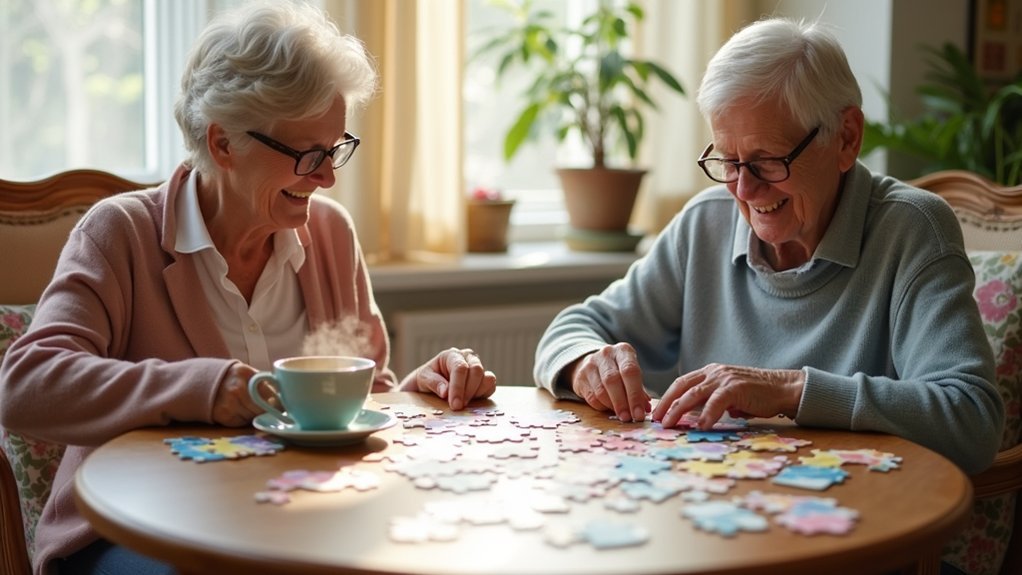
While aging naturally affects cognitive abilities, regularly engaging in brain exercises and puzzles can markedly slow this decline.
Sudoku and crossword puzzles enhance cognitive function and memory in seniors, particularly those with mild cognitive impairment.
Research shows Sudoku and crosswords significantly improve mental sharpness in older adults, especially those experiencing early memory challenges.
Strategy games like chess stimulate planning abilities and critical thinking, potentially shielding against cognitive decline.
You’ll also benefit from jigsaw puzzles, which activate perception and reasoning functions that help protect against brain aging.
Don’t overlook word games such as Scrabble, which boost vocabulary and verbal fluency while enhancing memory retention.
For mathematical mental agility, number puzzles improve numerical understanding and overall cognitive performance.
Word Games and Writing Activities for Mental Fitness
Word games like Scrabble and crosswords sharpen your cognitive abilities while expanding your vocabulary and memory capacity.
You’ll find that regular journaling helps organize your thoughts and improve memory retention, making it easier to recall important events in your daily life.
Creative writing activities and language learning offer powerful brain workouts that can delay cognitive decline and enhance your overall mental fitness.
Word Games for Sharpness
Because language skills directly impact cognitive health, word games offer seniors a delightful way to maintain mental sharpness. When you regularly engage in Scrabble, crosswords, or word searches, you’re actively boosting your vocabulary while enhancing problem-solving skills and pattern recognition abilities.
These activities aren’t just entertaining—they’re powerful tools for improving memory recall and information processing. Research shows that consistent participation strengthens cognitive functions essential for aging brains.
If you’re learning a second language through word games, you’re gaining additional protection, as bilingualism has been linked to lower Alzheimer’s risk and delayed dementia onset.
Beyond the cognitive benefits, word games foster valuable social interaction when played with others. Complement these activities with journaling or creative writing to further organize your thoughts and enhance your mental fitness.
Journaling Improves Memory
As a powerful complement to traditional word games, journaling stands out for its remarkable memory-enhancing benefits. When you regularly document your thoughts and experiences, you’re strengthening neural connections associated with memory recall while engaging in a valuable mental exercise.
| Journaling Benefit | Cognitive Impact | Implementation Tip |
|---|---|---|
| Expressive writing | Stress reduction | Write about emotions |
| Daily reflection | Enhanced awareness | Record daily events |
| Vocabulary use | Cognitive health | Try new words |
| Memory tracking | Self-assessment | Note changes over time |
Journaling supports cognitive function in multiple ways—you’re practicing language skills, organizing thoughts, and creating a personal record you can revisit. This self-reflection tool helps you monitor cognitive changes while reducing anxiety that can impair memory. You’re not just preserving memories; you’re actively strengthening your brain’s ability to retain them.
Creative Writing Benefits
Beyond traditional brain exercises, creative writing offers profound cognitive advantages for seniors seeking to maintain mental sharpness. When you engage with word games like Scrabble or crosswords, you’re actively building vocabulary and honing problem-solving skills essential for cognitive health.
Try incorporating short story writing or journaling into your routine to strengthen memory recall and organizational abilities. These creative writing activities aren’t just mentally stimulating—they provide a therapeutic outlet for expressing thoughts and emotions, reducing anxiety and depression.
Consider joining a writing workshop where you’ll combine cognitive benefits with valuable social interaction. This community engagement greatly contributes to your emotional well-being.
For bilingual seniors, language-focused writing exercises offer additional protection against cognitive decline, potentially lowering your risk of Alzheimer’s and dementia while maintaining mental fitness.
The Power of Music and Arts for Neural Stimulation
You’ll find remarkable benefits for your aging brain when you engage regularly with music, which strengthens neural connections and enhances memory recall.
Creating art, whether through painting or drawing, activates multiple brain regions simultaneously, improving cognitive function while providing emotional expression.
Both activities offer powerful yet enjoyable ways to maintain mental sharpness, with research showing they’re particularly effective for seniors seeking to preserve their cognitive abilities.
Music Enriches Neural Pathways
The remarkable power of music resonates far beyond entertainment, actively transforming neural connections within the aging brain. When you engage with melodies and rhythms, you’re activating multiple neural pathways that enhance cognitive health and memory function simultaneously.
For seniors, music offers a powerful form of cognitive stimulation that requires no special training. You’ll likely experience reduced anxiety and improved relaxation when listening to classical compositions. Music’s ability to evoke emotional well-being makes it particularly valuable for those with Alzheimer’s disease, often revealing memories otherwise difficult to access.
Whether you’re learning an instrument or simply enjoying your favorite songs, you’re giving your brain an extensive workout. The neural benefits extend beyond the moment of listening, contributing to better sleep quality and sustained mental clarity.
Art Therapy Benefits Memory
Creativity opens remarkable cognitive benefits when seniors engage in artistic expression. When you participate in art therapy, you’re activating essential brain regions associated with attention and emotion, enhancing visual-spatial reasoning and memory recall simultaneously.
The creative arts promote neuroplasticity by forming new neural connections vital for maintaining cognitive health as you age. Painting, drawing, and other artistic pursuits stimulate multiple cognitive functions while reducing depression and anxiety—providing an all-encompassing approach to mental health maintenance.
Beyond individual benefits, art activities foster valuable social interactions that combat isolation. These shared creative experiences create emotional connections that support overall well-being.
Whether you’re a lifelong artist or just beginning to explore creative expression, art therapy offers a powerful, enjoyable approach to preserving cognitive function and enriching your senior years.
Gardening and Cooking as Therapeutic Brain Exercises

While many brain-training activities involve puzzles or games, gardening and cooking offer seniors unique therapeutic benefits that stimulate multiple cognitive functions simultaneously. When you dig in soil or follow recipes, you’re engaging problem-solving skills while reducing stress levels.
Gardening provides sensory awareness through physical activity, protecting against cognitive decline while enhancing memory and attention.
Similarly, cooking challenges you to use math and creativity, stimulating cognitive function as you learn new recipes.
Both activities contribute considerably to emotional well-being by reducing feelings of depression and anxiety.
You’ll find additional benefits through social interaction—join community gardening projects or cooking classes to foster connections with others.
These everyday activities create purposeful engagement that improves your overall mental health while offering practical skills you can enjoy throughout your senior years.
Physical Movement: Essential Exercise for Brain Health
Although many seniors focus primarily on mental exercises for brain health, movement-based activities deliver equally powerful cognitive benefits that shouldn’t be overlooked.
Regular light-to-moderate exercise notably reduces your dementia risk by promoting blood flow to the brain and enhancing overall health.
Activities like walking, swimming, yoga, and tai chi improve balance while stimulating neuroplasticity—your brain’s ability to form new neural connections essential for maintaining mental acuity.
Research confirms that physical movement directly improves cognitive function, especially memory and decision-making abilities.
Don’t exercise alone! Group activities provide dual benefits: they keep you physically active while fostering social interaction critical for emotional wellbeing.
Social Engagement and Community Activities for Cognitive Wellness
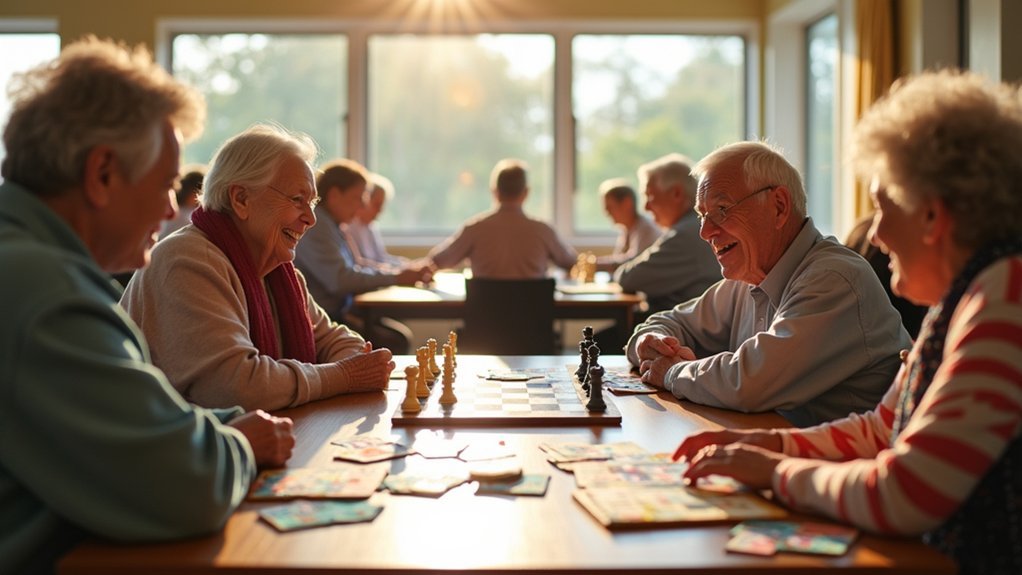
Beyond solo brain games, meaningful social connections provide powerful cognitive benefits for seniors seeking to maintain mental sharpness.
When you participate in community activities, you’re not just passing time—you’re actively contributing to your cognitive wellness. Social engagement stimulates mental interaction that can slow cognitive decline while enhancing your problem-solving skills and critical thinking abilities.
- Join a book club or trivia night to foster a sense of belonging while reducing isolation and improving emotional health
- Volunteer regularly to find purpose and build essential social connections that support cognitive health
- Attend community events where shared experiences stimulate enriching conversations
- Enroll in group classes like art or exercise to learn new skills, promoting neuroplasticity through socialization
Lifelong Learning and Reading Practices for Mental Longevity
As your brain continues to develop throughout your lifetime, engaging in consistent learning activities creates essential neural pathways that support cognitive resilience.
Whether you’re attending lectures or enrolling in online courses, lifelong learning keeps your mind active and fortifies cognitive health.
Make reading practices part of your daily routine—they’re linked to reduced dementia risk while enhancing vocabulary.
Complement this with creative writing through journaling or blogging to improve memory function and self-expression.
For maximum neuroplasticity benefits, challenge yourself by learning new skills like playing an instrument or speaking another language.
Don’t underestimate the power of social interaction—joining book clubs combines cognitive engagement with emotional well-being.
These intellectual pursuits collectively contribute to mental longevity, helping you maintain sharp cognitive abilities throughout your senior years.
Frequently Asked Questions
What Is the Best Brain Booster for Seniors?
You’ll boost your brain health most by engaging in puzzles, playing strategy games, learning new skills, reading regularly, and joining social activities. These increase cognitive function, memory, and overall mental well-being.
What Is the Number One Exercise for the Brain?
Crossword puzzles and Sudoku are the number one exercise for your brain. You’ll enhance cognitive function, memory, and problem-solving skills when you engage regularly. They’re proven to reduce cognitive decline risk in seniors.
How to Improve Brain Function in Seniors?
You’ll boost brain function by doing puzzles like Sudoku, learning new skills, exercising regularly, staying socially active, and reading daily. These activities stimulate neuroplasticity and greatly reduce your risk of cognitive decline.
What Is the Best Exercise to Reduce Memory Loss in Older Adults?
You’ll benefit most from a combination of daily walking and cognitive puzzles like Sudoku. Don’t forget to socialize regularly and learn new skills—these activities together form the most effective exercise routine for preserving memory.
In Summary
You’ve got so many ways to keep your brain sharp as you age! Whether you’re solving puzzles, playing music, gardening, staying physically active, or learning new skills, you’re strengthening cognitive connections. Don’t forget the essential importance of social engagement too. By incorporating these activities into your daily routine, you’ll boost your brain health and enjoy a more vibrant quality of life.

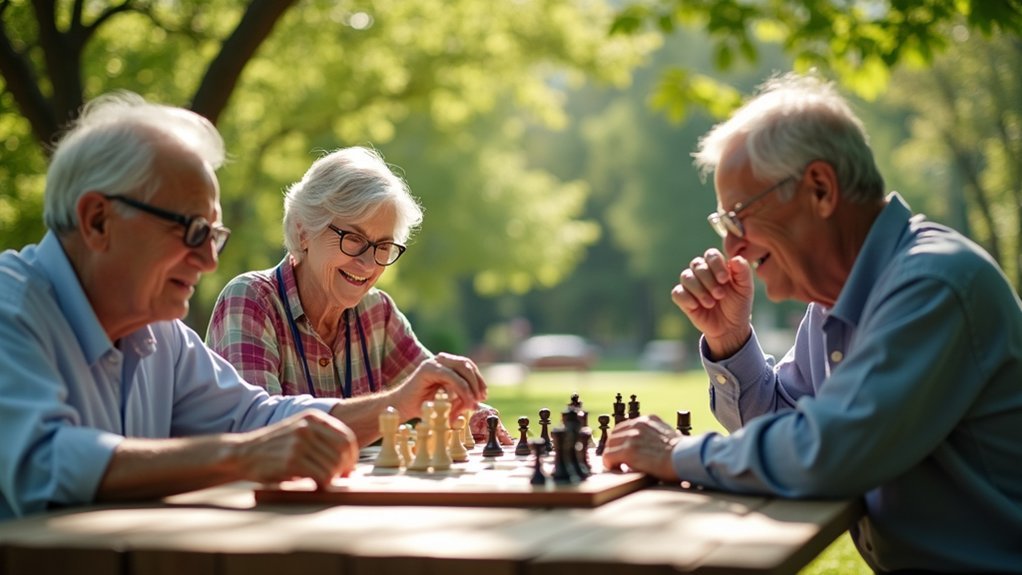

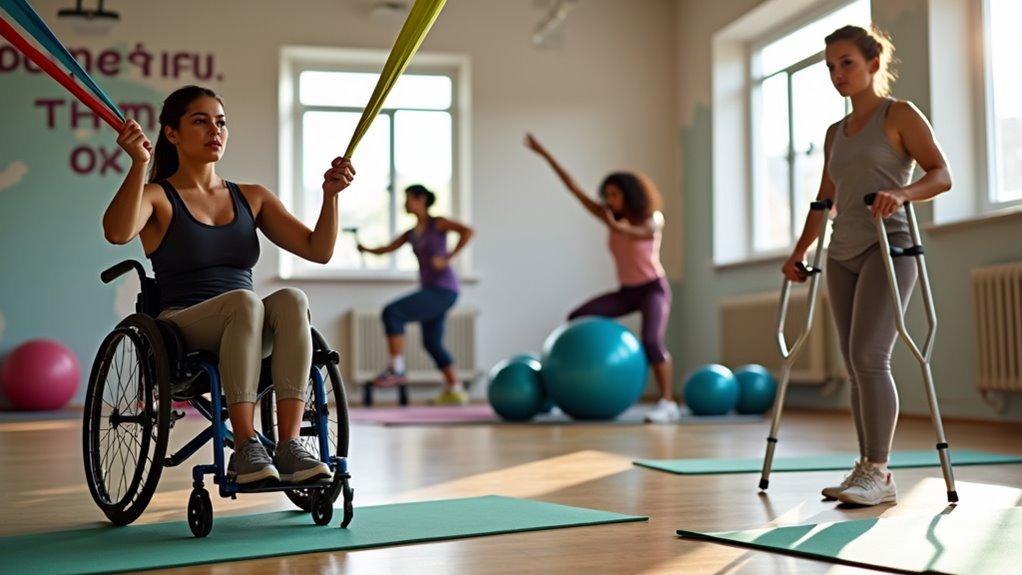
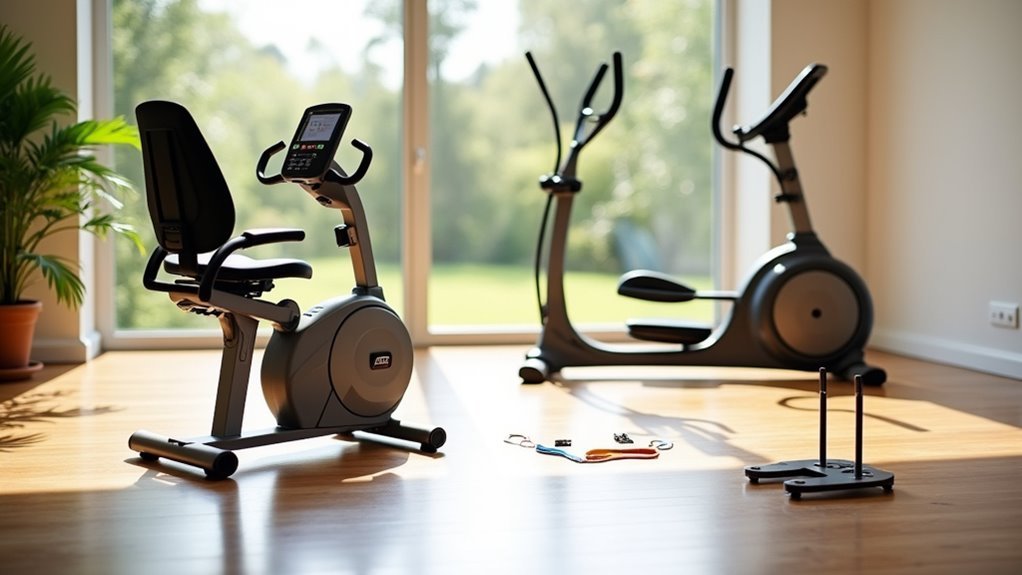
Leave a Reply